#but i wish comic purists in general would realise that these are ADAPTATIONS
Explore tagged Tumblr posts
Text
It's so nice being a Moon Knight fan when you don't have a comic purist telling you how much you suck for enjoying the show as well.
#im getting annoyed again#this is about a tweet someone made on x the everything app#they did a 'we listen and we don't judge' for MK#and#of course#most of the replies were ppl saying that they actually like the show#which OP replied to saying that they do in fact judge...#LIKEEEE#OBVIOUSLY thats what people were going to say for their opinion???#either you're baiting or you're a lovely combination of daft and dense#i fear its the latter as this is the number 1 MK comic purist on X the everything app#like they literally go out of their way to harass MCU fans#and its like... do you even enjoy the character or do you just enjoy hating#and YES the show is flawed#and YES i wish it had better Jewish rep#but i wish comic purists in general would realise that these are ADAPTATIONS#it's never going to be 1:1#isn't that more exciting to you???#having something new and a fresh take on a character rather than verbatim??#it is to me#and i think mk especially does a nice job at this#mcu knight is a nice different ADAPTATION which i personally really like#sigh#ANYWAYS#moon knight
61 notes
·
View notes
Text
Watchmen - Movie blog
(SPOILER WARNING: The following is an in-depth critical analysis. if you haven’t seen this movie yet, you may want to before reading this review)
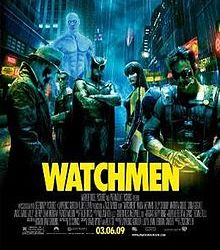
A movie adaptation of Watchmen had been in development in some form or another since the graphic novel was first published back in 1987. Over the course of its two decade development cycle, being passed from filmmaker to filmmaker who each had their own vision of what a Watchmen movie should be, fans objected to the idea of a movie adaptation, describing Watchmen as ‘unfilmmable.’ Alan Moore himself condemned the effort to adapt his work, saying that Watchmen does things that can only be done in a comic book. But where there’s a will, there’s a way, and in 2009, Watchmen finally came to the big screen, directed by Zack Snyder.
I confess it took me a lot longer to write this review than I intended and that’s largely because I wasn’t sure how best to approach it. Snyder clearly has a lot of love and respect for the source material and tried his best to honour it as best he could. Snyder himself even said that he considers the film to be an advert for the book, hoping to get newcomers interested in the material. So how should I be looking at this film? As an adaptation or as an artistic tribute? More to the point, which of the three versions of the film should I be reviewing? The original theatrical cut, the director’s cut or the ultimate cut? Which best reflects Snyder’s artistic vision?
After much pondering, I decided to go with the director’s cut. The theatrical release was clearly done to make studio execs happy by keeping the runtime under three hours, but it comes at the cost of major plot points and character moments being chucked away. The ultimate cut however comes in at a whopping four hours and is arguably the most accurate to the source material as it also contains the animated Tales Of The Black Freighter scenes. However these scenes break the narrative flow of the film and were clearly not intended to be part of the final product, being inserted only to appease the fans. The director’s cut feels most like Snyder’s vision, clocking in at three and half hours and following the graphic novel fairly closely whilst leaving room for artistic licence.
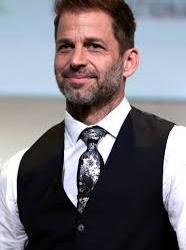
Now as some of you may know, while I’m not exactly what you would call a fan of Zack Snyder’s work, I do have something of a begrudging respect for him due to his willingness to take creative risks and attempt to tell more complex, thought provoking narratives that don’t necessarily adhere to the blockbuster formula. Films like Watchmen and Batman Vs Superman prove to me that the man clearly has a lot of good ideas and a drive to really make an audience think about what they’re watching and question certain things about the characters. The problem is that he never seems to know how best to convey those ideas on screen. In my review of Batman Vs Superman, I likened him to a fire hose. Extremely powerful, but unless you’ve got someone holding onto the thing with both hands and pointing it in the right direction, it’s just going to go all over the place. I admire Snyder’s dedication and thought process, but I think the fact that his most successful film, Man Of Steel, also happens to be the one he had the least creative influence on speaks volumes. When he’s got someone to work with and bounce ideas off of, he can be a creative force to be reckoned with. Left to his own devices however, and his films tend to go off the rails very quickly.
Watchmen is very much Snyder’s passion project. You can tell a lot of care and effort went into this. The accuracy of the costumes, staging and set designs speak for themselves. However there is an underlying problem with Snyder trying to painstakingly recreate the graphic novel on film. While I don’t agree with the purists who say that Watchmen is ‘unfilmmable’, I do agree with Alan Moore’s statement that there are certain aspects of the graphic novel that can only work in a graphic novel. A key example of this is its structure. Watchmen has the luxury of telling its non-linear narrative over twelve issues in creative and unorthodox ways. A structure that’s incredibly hard to translate into any other medium. A twelve episode TV mini-series might come close, but a movie, even a three hour movie, is going to struggle due to the sheer density of the material and the unconventional structure. Whereas the structure of the graphic novel allowed Alan Moore to dedicate whole chapters to the origin stories of Doctor Manhattan and Rorschach and filling in the gaps of this alternate history, the structure of a movie doesn’t really allow for that. And yet Snyder tries really hard to follow the structure of the book even though it simply doesn’t work on film, which results in the movie coming to a screeching halt as the numerous flashbacks and origin stories disrupt the flow of the narrative, causing it to stop and start constantly at random intervals, like someone kangarooing in a rundown car.
Just as Watchmen the graphic novel played around with the common tropes and framing devices of comics, Watchmen the movie needed to play around with the common tropes and framing devices of comic book movies. To Snyder’s credit, there are moments where he does do that. The most notable being the first five minutes where we see the entire history of the world of Watchmen during the opening credits while ‘The Times They Are A-Changing’ is played in the background. This is legitimately good. It depicts the rise and fall of the superhero in a way only a movie can. I wish Snyder did more stuff like this rather than restricting himself to just recreating panels from the graphic novel.
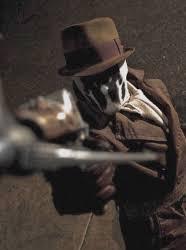
Which is not to say I think the film is bad. On the contrary, I think it’s pretty damn good. There’s a lot of things to like about this movie. The biggest, shiniest gold star has to go to Jackie Earle Haley as Rorschach. While the movie itself was divisive at the time, Haley’s portrayal of Rorschach was universally praised as he did an excellent job bringing this extreme right wing bigot to life. He has become to Rorschach what Ryan Reynolds is to Deadpool or what Mark Hamill is to the Joker. He is the character (rather tragically. LOL). To the point where it’s actually scary how similar Haley looks to Walter Kovacs from the graphic novel. The resemblance is uncanny.
Another standout performance is Jeffery Dean Morgan as the Comedian. Just as depraved and unsavoury as the comic version, but Morgan is also able to inject some real charm and pathos into the character. You believe that Sally Jupiter would have consensual sex with him despite everything he did to her before. But his best scene I think was his scene with Moloch (played by Matt Frewer) where the Comedian expresses regret for all the terrible things he did. It’s a genuinely emotional and impactful scene and Morgan manages to wring some sympathy out of the audience even though the character doesn’t really deserve it. But that’s what makes Rorschach and the Comedian such great characters. Yes they’re both depraved individuals, but they’re also fully realised and three dimensional. They feel like real people, which is what makes their actions and morals all the more shocking.
Then there’s Doctor Manhattan, who in my opinion stands as a unique technical achievement in film. The number of departments that had to work together to bring him to life is staggering. Visual effects, a body double, lighting, sound, it’s a truly impressive collaborative effort, all tied together by Billy Crudup’s exceptional performance. He arguably had the hardest job out of the whole cast. How do you portray an all powerful, emotionless, quantum entity without him coming across as a robot? Crudup manages this by portraying Manhattan as being less emotionless and more emotionally numb, which makes his rare displays of emotion, such as his shock and anger during the TV interview, stand out all the more. It’s a great depiction that I don’t think is given the credit it so richly deserves.
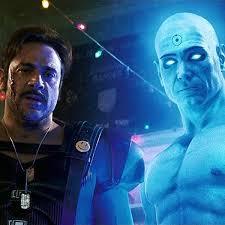
Which leads into something else about the movie, which will no doubt be extremely controversial, but I’m going to say it anyway. I much prefer the ending in the film to the ending in the book.

Hear me out.
In my review of the final issue of Watchmen, I said I didn’t like the squid because of its utter randomness. The plot of the movie however works so much better both from a narrative and thematic perspective. Ozymandias framing Doctor Manhattan makes a hell of a lot more sense than the squid. For one thing, it doesn’t dump a massive amount of new info on us all at once. It’s merely an extension of previously known facts. We know Ozymandias framed Manhattan for giving people cancer to get him off world. It’s not much of a stretch to imagine the world could also buy that Manhattan would retaliate after being ostracised. We also see Adrian and Manhattan working together to create perpetual energy generators, which turn out to be bombs. It marries up perfectly with the history of Watchmen as well as providing an explanation for why there’s an intrinsic field generator in Adrian’s Antarctic base. It also provides a better explanation for why Manhattan leaves Earth at the end despite gaining a newfound respect for humanity. But what I love most of all is how it links to Watchmen’s central themes.
Thanks to the existence of Doctor Manhattan, America has become the most powerful nation in the world to the point where its disrupted the global balance of power. This has led to the escalation of the Cold War with Russia as well as other countries like Vietnam being at the mercy of the United States. It also allowed Nixon to stay in office long after his two terms had expired. The reason the squid from the book is so unsatisfying as a conclusion is because you don’t buy that anyone would be willing to help America after the New York attack. In fact it would be more likely that Russia and other countries might take advantage of America’s vulnerability. Manhattan’s global attack however not only gives the whole world motivation to work together, it also puts America in a position where they have no choice but to ask for help because it was they that effectively created this mess in the first place. So seeing President Nixon pleading for a global alliance feels incredibly satisfying because we’re seeing a corrupt individual hoist by his own petard and trying to save his own skin, even if it comes at the cost of his power. America is now like a wounded animal, and while world peace is ultimately achieved, the US is now a shadow of its former self. It fits in so perfectly with the overall story of Watchmen, frankly I’m amazed Alan Moore didn’t come up with this himself.
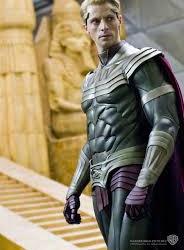
It’s not perfect however. Since the whole genetic engineering stuff no longer exists, it makes the existence of Adrian’s pet lynx Bubastis rather perplexing. Also the whole tachyons screwing with Doctor Manhattan’s omniscience thing still doesn’t make a pixel of sense. But the biggest flaw is in Adrian Veidt’s characterisation. For one thing, Matthew Goode’s performance isn’t remotely subtle. He practically screams ‘bad guy’ the moment he appears on screen. He has none of the charm or charisma that the source material’s Ozymandias had. But it’s worse than that because Snyder seems to be going out of his way to uncomplicate and de-politicise the story and characters. There’s no mention of Adrian’s liberalism or his disdain for Nixon and right wing politics. The film never explores his obsession with displaying his own power and superiority over right wing superheroes like Rorschach and the Comedian. He’s just the generic bad guy. And I do mean bad guy. Whereas the graphic novel left everything up to the reader to decide who was morally in the right, the film takes a very firm stance on who the audience should be siding with. Don’t believe me? Just look at how Rorschach’s death is presented to us.
It’s very clear while watching the film that Zack Snyder is a big Rorschach fan. He gets the most screen time and there’s a lot of effort dedicated to his portrayal and depiction. And that’s fine. There’s nothing necessarily wrong with that. As I’ve mentioned before in previous blogs, Rorschach is my favourite character too. However it’s important not to lose sight of who the character is and what he’s supposed to represent, otherwise you run the risk of romanticising him, which is exactly what the film ends up doing. Rorschach’s death in the graphic novel wasn’t some heroic sacrifice. It was a realisation that he has no place in the world that Ozymandias has created, as well as revealing the hypocrisy of the character. In the extra material provided in The Abyss Gazes Also, we learn that, as a child, Walter supported President Truman’s use of the atomic bomb in Hiroshima and Nagasaki, and yet, in his adult life, he opposes Adrian’s plan. Why? What’s the difference? Well the people who died in Hiroshima and Nagasaki weren’t American. They were Japanese. The enemy. In Rorschach’s mind, they deserved to die, whereas the people in New York didn’t. It signifies the flawed nature of Rorschach’s black and white view of the world as well as displaying the racist double standards of the character. Without the context of Hiroshima and Nagasaki, Rorschach’s death becomes skewed. This is what ends up happening in the movie. Rorschach removes his mask and makes a bold declaration to Doctor Manhattan, the music swells as he is disintegrated, defiant to the last, and his best friend Nite Owl screams in anguish and despair.
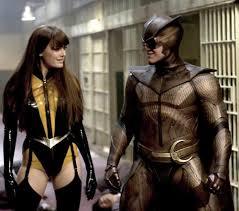
In fact the film takes it one step further by having Nite Owl punch Adrian repeatedly in the face and accuse him of deforming humanity, which completely contradicts the point of Dan Dreiberg as a character. He’s no longer the pathetic centrist who requires a superhero identity to feel any sort of power or validation. He’s now the everyman representing the views of the audience, which just feels utterly wrong.
This links in with arguably the film’s biggest problem of all. The way it portrays superheroes in general. The use of slow motion, cinematography and fight choreography frames the superheroes and vigilantes of Watchmen as being powerful, impressive individuals, when really the exact opposite should be conveyed. The costumes give the characters a feeling of power, but that power is an illusion. Nite Owl is really an impotent failure. Rorschach is an angry bigot lashing out at the world. The Comedian is a depraved old man who has let his morals fall by the way side so he can indulge in his own perverse fantasies. They’re not people to be idealised. They’re to be at pitied at best and reviled at worst. So seeing them jump through windows and beating up several thugs single handed through various forms of martial arts ultimately confuses the message, as does the use of gratuitous gore and violence. Are we supposed to be shocked by these individuals or in awe?
Costumes too have a similar problem. Nite Owl and Ozymandias’ costumes have been updated so they look more imposing, which kind of defeats the purpose of them. The point is they look silly to us, the outside observers, but they make the characters feel powerful. That juxtaposition is lost in the film. And then there’s the Silk Spectre. In the graphic novel, both Sally and Laurie represent the changing attitudes of women in comics and in society. Both Silk Spectres are sexually objectified, but whereas Sally accepts it as part of the reality of being a woman, Laurie resists it, seeing it as demeaning. The only reason she wore her revealing costume in A Brother To Dragons was because she knew that Dan found it sexually attractive and she wanted to indulge his power fantasy. None of this is touched upon in the film, other than one passing mention of the Silk Spectre porn magazine near the beginning of the film. There’s not even any mention of how impractical her costume is, like the graphic novel does. Yes the film changes her look drastically, but it’s still just as impractical and could have been used to make a point on how women are perceived in comic book films, but it never seems to hinder her in anyway. It’s never even brought up, which is ridiculous. Zack Snyder’s reinterpretation of Silk Spectre is clearly meant to inject some form of girl power into the proceedings, as she’s presented as being just as impressive and kick-ass as the others, when the whole point of her character was to expose the misogyny of the comics industry at the time and how they cater to the male gaze. Now don’t get me wrong, I’m not saying the graphic novel did it perfectly, but it did it a hell of a lot better than this.
Die hard fans have described the film over the years as shallow and ‘style over substance.’ I don’t think that’s entirely fair. It’s clear that Zack Snyder has a huge respect for the graphic novel and wanted to do it justice. Overall the film has a lot of good ideas and is generally well made. However, as much as Snyder seems to love Watchmen, it does seem like he only has a surface level understanding of it, hence why the attention and effort seems to be going into the visuals and the faithfulness to Alan Moore’s attention to detail rather than the Watchmen’s story and themes. While the film at times makes some good points about power, corruption and morality, it doesn’t go nearly as far as the source material does and seems to shy away from really getting into the meat of any particular topic. Part of that I suspect is to do with marketability, not wanting to alienate casual viewers, but I think a lot of it is to do with it simply being in the wrong medium. I personally don’t think you can really do a story as complex and intricate as Watchmen’s justice in a Hollywood film. In my opinion, this really should have been a TV mini-series or something.
So on the whole, while I appreciate Snyder’s attempt at bringing the story of Watchmen to life and can see that he has the best intentions in mind, I don’t think this film holds a candle to the original source material.
22 notes
·
View notes